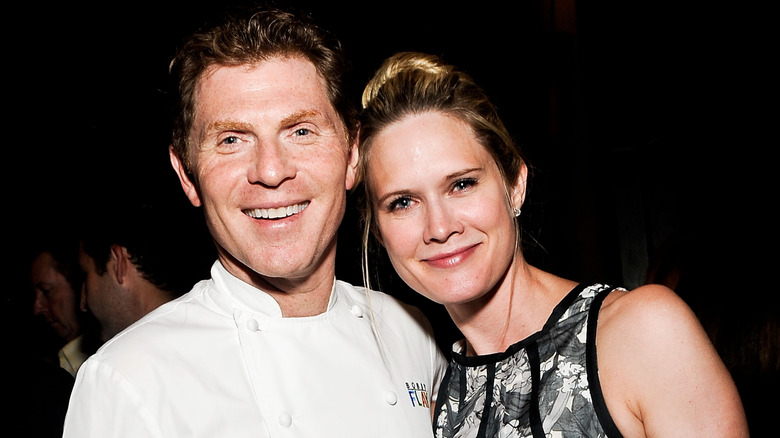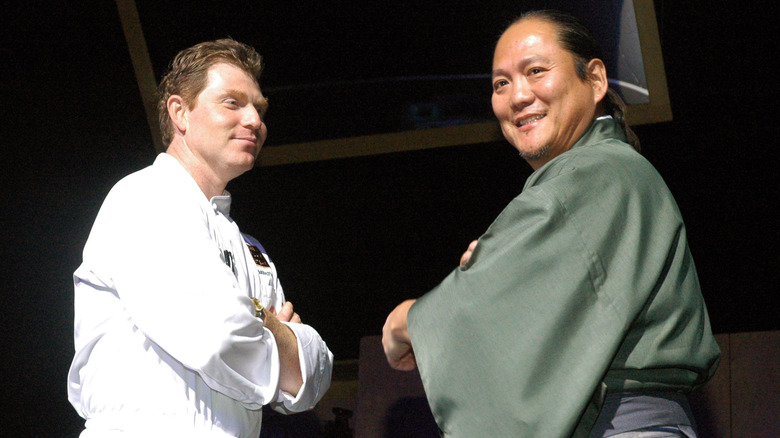Personal Struggles That Shaped Bobby Flay's Career
For over three decades, Bobby Flay has been one of the most recognizable faces in American food culture. A New York native with a taste for Southwestern flair and a knack for showmanship, Flay built an empire that spans cookbooks, restaurants, and countless television appearances. He's not just a chef. Bobby Flay is a brand, a Food Network cornerstone, and a household name. But when you cook in the spotlight for as long as Flay has, eventually, something's bound to boil over. And no, we're not just talking about his controversial preference for medium steak over medium rare.
While Flay was serving up seared steak and TV charm, the heat behind the scenes was often just as intense. With a career this long and loud, the headlines haven't always been five-star. There have been simmering scandals, burnt bridges, and more than one dish served cold. From restaurant closures and wage disputes to dramatic exits, on-air antics, and a tabloid-worthy divorce, Flay's journey has been anything but bland.
Let's dig into the spicy, messy, and unforgettable moments that helped define and complicate the legacy of one of America's most famous chefs.
His learning disability sparked a culinary calling
Bobby Flay's path to becoming one of America's most recognizable chefs, restaurateurs, and authors didn't exactly go by the book. As a kid growing up in New York City, Flay struggled with traditional classroom learning and found it difficult to focus or retain information the way other students could. "There's no question that I have a learning disability," Flay told Today.com. "Retention, reading, studying. I basically did no homework my entire scholastic career."
But rather than letting his learning disability hold him back, Flay found confidence and direction in an unlikely place: the kitchen. As a teenager, he dropped out of high school and worked full-time at Joe Allen, a famous restaurant in Manhattan's theater district. Although he couldn't always follow along in a classroom, cooking became a language he could fully understand and master. His natural talent quickly caught the eye of the restaurant's owner, who was so impressed by the young line cook's drive and instinct that he offered to pay Flay's tuition to culinary school where he would go on to learn a few life-changing techniques.
From that point on, Flay's path was clear. He threw himself into the world of food with focus and determination, turning what once felt like a limitation into a lifelong passion and eventually, a legendary career.
Flay's Iron Chef meltdown
Bobby Flay's dramatic exit from Iron "Chef Showdown," one of food TV's most storied franchises, in 2017 left producers stunned.. During the taping of an episode, Flay shocked everyone by removing his apron mid-battle to reveal a T-shirt that read, "This is my last Iron Chef battle ever." The unanticipated move caught the production team off guard, as the show was filmed live, and the stunt couldn't be edited out.
When confronted by producers concerned about the inability to cut around the incident, Flay reportedly responded, "I know, that's the point." Flay described the act to Vanity Fair as a lighthearted joke, but acknowledged that it might not have been the best decision, admitting it caused unnecessary confusion.
Flay cited exhaustion from the intense demands of the competition as a primary reason for his departure. Having participated in over 100 battles, he found the physical and emotional toll overwhelming. "They are exhausting physically, but even more so, they are exhausting emotionally," he told People. "When I do a season, I do between six and eight [battles] in a week, and it crushes me because it's 60 minutes of pure energy, creativity, and execution."
Bobby Flay's Gato bows out
In March 2020, as the COVID-19 pandemic began to upend daily life across the globe, Bobby Flay made the difficult decision to close his acclaimed New York City restaurant, Gato. Located in the NoHo neighborhood, the Mediterranean-inspired eatery was popular for its bold flavors and inventive dishes, with The New York Times praising "Gato shows an all-too-rare generosity in its flavors, its eager service, its good-tempered desserts."
Even though Gato was just one restaurant in Flay's portfolio, as it showcased his ability to adapt his culinary style, and the restaurant's menu featured a range of Mediterranean dishes that highlighted Flay's flair for bold, vibrant flavors.
Flay announced the closure via social media, stating, "As of tonight, I am closing my restaurant @gatonyc1 because of the obvious and unprecedented circumstances threatening our world. I wish everyone well. Be Smart. Be Safe." The announcement came as New York City implemented strict measures to stop the spread of the virus, leading to widespread restaurant closures. Gato's shutdown was part of a broader trend that saw numerous chefs temporarily or permanently close their establishments.
Leasing issues end 20+ years of Mesa Grill
Bobby Flay's Mesa Grill was considered the birthplace of bold Southwestern flair. The restaurant opened in 1991 near Union Square and was the first solo venture for the then-rising chef. For over two decades, the bright turquoise dining room was a go-to for food lovers and critics, earning accolades and cementing Flay's place in New York's culinary scene.
What began in 1991 as Flay's playplace for fusion fun (think, coffee-rubbed filets mignons with ancho-mushroom sauce and sweet potato and roasted plantain soup with smoked chile crema) became a mini-empire, spawning other restaurants in Las Vegas and the Bahamas. But in 2013, after 22 years of service, the original location closed its doors, not because of a dip in quality or popularity, but due to leasing issues with the landlord, reminding everyone that prime real estate can be even tougher than over-cooked prime rib.
The other Mesa Grill Restaurants followed suit in the coming years, but Flay didn't sit idly. He pivoted to fresh concepts and kept adding new chapters to his culinary playbook, proving that sometimes when one restaurant door closes, a lot more open.
He had a tumultuous divorce from Stephanie March
Bobby Flay's decade-long marriage to "Law & Order: SVU" actress Stephanie March unraveled in 2015 in a flurry of tabloid headlines, legal drama, and messy public allegations. What had once appeared to be a power couple pairing between the celebrity chef and TV actress soon became fodder for gossip columns as details of their split emerged.
The divorce wasn't quiet or clean. Reports circulated that March accused Flay of having an affair with a hostess who worked at one of his restaurants and later became his personal assistant. Rumors of additional infidelities, including one with actress January Jones, from AMC's "Mad Men," added fuel to the fire and painted an unflattering picture of the Food Network star at the height of his fame.
Beyond personal drama, the pair clashed over finances. March argued the terms of their prenuptial agreement, seeking a more significant share, and although the two eventually reached a settlement and parted ways for good, the damage to Flay's public image lingered. The divorce dominated headlines and became one of the most high-profile celebrity breakups of the year.
Public shaming during Walk of Fame ceremony
In 2015, just as Bobby Flay was receiving one of Hollywood's highest honors, a star on the Walk of Fame, his personal drama quite literally took to the skies. During the official ceremony in Los Angeles, as Flay smiled for cameras and posed with his newly minted star, a plane circled overhead carrying a not-so-subtle banner that read: "CHEATER."
The moment was surreal and unmissable. Media outlets quickly picked up the story, speculating whether the stunt was connected to Flay's very public and very messy divorce from actress Stephanie March. While no one officially claimed responsibility, the timing left little doubt in the public's mind.
What should have been a celebratory milestone in Flay's career instead became an unforgettable example of personal scandal colliding with professional recognition. The incident added another layer of drama to an already turbulent year and cemented Flay's Walk of Fame ceremony as one of the most awkward in recent Hollywood history.
Legal issues with restaurant staff
In 2009, Bobby Flay's restaurant group, Bold Food LLC, which ran spots like Bar Americain, Mesa Grill in both New York and Las Vegas, and Bobby Flay Steak in Atlantic City, was hit with a class-action lawsuit from former employees.
The suit accused the company of a laundry list of labor violations, including mishandling tips through improper tip-pooling, failing to pay proper overtime to those working over 40 hours a week, and not reimbursing workers for the cost of uniforms. It also claimed that mandatory gratuities charged to private party customers weren't fully passed on to the staff, and that some of those tips were allegedly given to employees who weren't eligible to receive them. One of the plaintiffs claimed he was suspended from Bar Americain in retaliation for raising concerns about the restaurant's tipping policies.
The case was eventually settled in 2010 for $800,000, with Flay's company denying any wrongdoing, but the lawsuit offered a glimpse behind the curtain of a high-profile hospitality empire and no doubt added a blemish to Flay's restaurant resume.
Disrespected Iron Chef Japan
Long before Bobby Flay's dramatic "I quit" stunt on "Iron Chef America," he had already stirred controversy on the original "Iron Chef Japan."
During a 2000 appearance on the cooking competition, Flay clashed with cultural expectations in a moment that sparked international backlash. After completing his dish during the timed battle, Flay stood on his cutting board in celebration. The gesture may have been a show of excitement for American viewers, but it was seen as deeply disrespectful by his Japanese hosts. In Japanese culinary tradition, the cutting board is considered a sacred tool, and standing on it was regarded as a serious breach of etiquette.
His opponent, the legendary Iron Chef Masaharu Morimoto, didn't hold back. "He's no chef," Morimoto said at the time. "He stood on the cutting board. In Japan, the cutting board is sacred."
Flay later apologized ... kind of. "It was like I killed his mother,” said Flay, according to the New York Times. ”I was really upset. I had apparently disrespected Morimoto. That's the last thing I wanted."
Flay's Michelin star fizzles out
For many chefs, earning a Michelin star is the pinnacle of culinary recognition, a golden seal of excellence that can define a career. But losing one? That can be a pointed signal that something's fallen short in the eyes of one of the most influential names in dining.
In 2008, Bobby Flay joined the star-studded ranks of Michelin-starred restaurants when his Mesa Grill Las Vegas location earned the award. It was a major nod to his bold, Southwestern-inspired cooking that had helped make him a household name. But the celebration didn't last long ...
By the 2009 edition of the Michelin Guide, Mesa Grill had lost its Michelin star. It wasn't due to a decline in quality or a bad review, but because Michelin stopped publishing its Las Vegas guide altogether, which in some ways makes the loss even more tragic. While the restaurant remained popular, the loss highlighted how easily even the top restaurants and chefs can fall from grace in the blink of an eye. For a chef as competitive and high-profile as Flay, losing his star was probably a humbling reminder that in the world of fine dining, no accolade is ever permanent.









